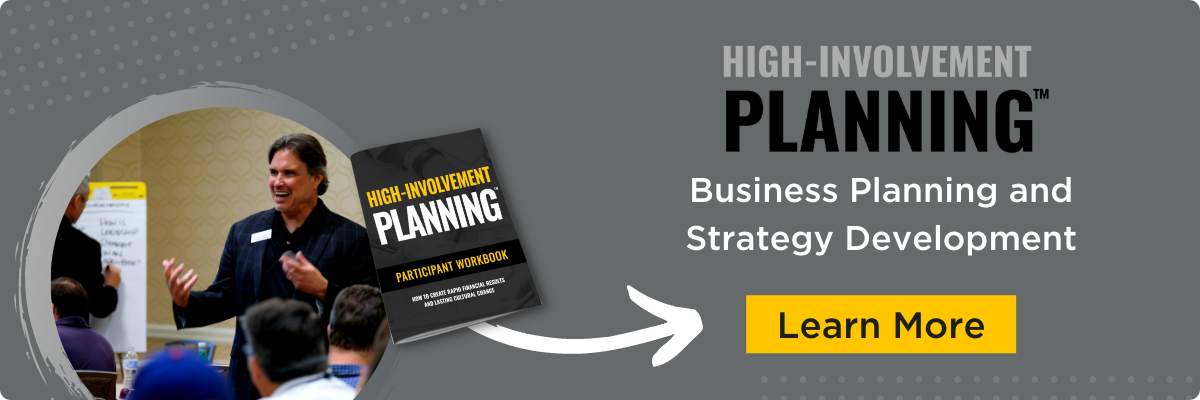I recently wrote a blog about how, when our company conducted our second High-Involvement Planning (HIP) meeting in October, only 74% of our associates told us they were confident in the sales plan for the company—which was down from an 80% confidence rating when we conducted the same survey in June.
Historically, we’ve seen confidence ratings consistently in the high 80s—sometimes into the 90s. Maybe it’s easy to write off the 74% number due to the ongoing uncertainty of the pandemic as well as the election and other factors. But it did get me wondering about what truly inspires confidence in people.
That led me to conduct an informal survey where I asked our associates to send me their responses to a simple question: “How do you build confidence?”
I was blown away by the diverse range of answers we received. I found it interesting to see all the different approaches people recommended, so I grouped them into a couple of categories:
Communication
- Build relationships that create trust and show respect.
- Embrace trust, understanding, honesty and transparency.
- Participation and voice in the process.
- Accountability: follow through on commitments.
- Believe in your mission and trust in your team.
- Open dialogue with healthy conflict.
- Use The Game to communicate ups and downs.
- Ensure huddles are consistent.
- Ask others to remember their Why.
- Share wins, no matter how small.
Processes/Tools
- Share accurate data.
- Give people the tools to do their jobs.
- Give people the necessary training.
- Must have the right team in place.
- Eliminate parts shortages.
- Complete dual-sourcing of all non-directed parts.
Living Up to the Plan
- Truly utilize HIP.
- Set realistic goals, with a clear plan for achieving them.
- Do what we say we will do.
- Clear line-of-sight on how everyone can make a difference.
- Give people context with a SWOT analysis.
- Keep the long-term goals—five and 10 years out—in sight.
I think our people did a good job of answering the question with some straightforward tactical advice. It was certainly an interesting range of responses that included the micro—like ensuring an adequate parts supply—to the macro, like teaching people the strengths, weaknesses, opportunities, and threats facing the business. But these answers, which were all pretty high level, also left me wondering if there isn’t something deeper involved in this question about confidence.
I also received a response that took a different tact. One associate wrote about why people don’t feel confident in the first place—which I think is a really interesting perspective to take. Here’s what they sent in:
Oftentimes, a lack of confidence is the result of feeling overwhelmed by circumstances that seem too big for you to control or too complex for you to understand. If I can’t understand something, if I don’t think I have the ability to affect change, then I am at the mercy of whatever happens. How can I feel confident?
What I love about this response is that it seeks to explain the root of the problem—the why behind someone’s lack of confidence. This associate then went on to say how you can go about addressing this challenge when someone feels overwhelmed or out of control:
During difficult times, I think it’s important to offer perspective with relatable stories about regular people, regular teams (just like us) that have survived and thrived in similar conditions. Share messages that focus attention on the things we CAN control and the things we CAN understand. And remind people that they are part of strong community that is fighting alongside one another.
If you have to build confidence, you have to have a mutual understanding. It’s about creating emotional intimacy—which applies whether you are in business, or in a marriage, or even with a friendship. You have to make absolutely certain the people understand each other or the situation—to get them to feel comfortable about being in control of what they can actually control. Without that sense of control, there are too many variables and we can get overwhelmed. It’s that inner voice we all hear from time to time that psyches us out and destroys confidence.
And this is what leads to The Great Game of Business®—which is a sequence or a methodology for helping people fix the things they can fix together. It gives you a team-based step-by-step approach to begin building confidence, especially when you don’t have it.
My big takeaway from this experiment is that I found the answer I was looking for: If you want to build confidence, you have to involve more people. You can’t do it alone.
Looking for more on how to increase employee engagement? Join us for our next workshop focusing on Implementation + Strategic Planning.
.png)




.jpg)




.png)




-5.png)
.png)
